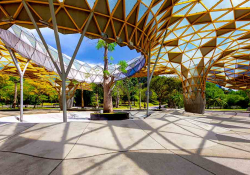Negotiating Nationhood through the Ethnography of “Literary Series” in Nigerian National Newspapers


LEFT: Femi Osofisan (Okinba Launko), a Nigerian playwright, poet, translator, critic, and theorist of literature, is also a regular columnist in Nigeria's leading newspapers. http://femiosofisan.org RIGHT: Nobel laureate Wole Soyinka, flanked by Ekiti State governor Kayode Fayemi (right) and Yemi Ogunbiyi (left) / NBF News, www.nigerianbestforum.com, February 8, 2011
The following essay explores literary journalism through the focal lens of “literary series” as an informed commentary on narrating and interrogating nationhood in postcolonial Nigeria. The 1980s onwards particularly witnessed the flourishing of this phenomenon by writers, critics, academics, and others to continue this vibrant tradition of national reinvention through literary journalism.
There exists a vital kinship between journalism and literature in variegated ways that have not been sufficiently acknowledged and articulated. Quite often, this dynamic relationship is ignored or overlooked in literary-critical discourses. However, a scrupulous appreciation of the literary dimensions of journalism and the journalistic temperament of literature reveals an organic link between the two disciplines, a link that is enriched and even overdetermined by their shared practices and strategies. Journalism and literature participate in the negotiation of social, economic, political, and cultural structures on which societies or nations rest. They are, therefore, strategic to societal engineering processes and the construction of postmodernity, especially now with the shrinking of traditional boundaries through new media technologies and the emergence of virtual spaces.
Of particular interest here is the phenomenon of “literary series” in Nigerian national newspapers, particularly the Guardian newspaper. Literary series in this context refer to the pages of a newspaper devoted to literary matters exclusively. The pullout is edited by literary journalists who are also the contributors to the series. The newspapers serve as sites for the articulation of literary concerns through the writing of stories, reviews of books, journals, periodicals, and other publications with a literary intent and consciousness. In addition, excerpts from previously published narratives, some of them biographies and autobiographies, memoirs, prison notes, and kindred narratives are also featured. What emerges ultimately is a collage of creative offerings that gives the newspapers an edge and twist resonating with a literary quality different from feature writing in newspapers.
Beginning in the 1930s, literary journalism was then mobilized as a critical weapon in the arsenal of political mass mobilization and as a strategy to subvert and undermine British imperial domination in Nigeria.
But discursive engagements in newspapers are not limited to the above concerns alone. Scholarly essays on literary issues such as the contentious debate on the functionality of literature in society, the sociality of art as against its mere aesthetic distillates, and the power of literature as an interventionist agency in societal transformation all resonate strongly in the contributions by literary journalists, academics, and scholars. Individual writers and their places in the literary canon as well as the historical mapping of literary traditions also form part of the discourses in the newspaper pages.
Literary journalism transcends the narrow confine of a generic typology dealing with the creative sensibilities of journalists, especially in the art of telling stories. While it combines the best of both practices—literature and journalism—in order to give the reader the most vivid and accurate picture of society, it is not limited to narrating stories, or short (non-)fiction. It also concerns itself with other literary matters and appropriately situates them within the historical, social, and political context in which each work was written. As Ron Rosenbaum argues, “Literary journalism isn’t about literary flourishes, it isn’t about literary references. Literary journalism at its best asks the questions that literature asks: about the nature of human nature and its place in [the] cosmos.” This is also why, according to David Abrahamson, the historical specificities that inform literary journalistic work are important and critical to the understanding of the human condition. As Susan Opt says, the human condition is central to “the creating, writing, or advancing of literary journalism.”
There has been a long, thriving tradition of literary journalism in Nigerian newspapers. One of the earliest Nigerian newspapers, the West African Pilot—founded and edited by foremost pan-Africanist and Nigeria’s first president, Dr. Nnamdi Azikiwe—volunteered some of its pages to literary discourses with journalists in the vanguard of driving the series. This was the period of nationalist ferment and political stirrings from the 1930s onward during which the clouds of the anticolonial resistance struggle were gathering in the political firmament. Literary journalism was then mobilized as a critical weapon in the arsenal of political mass mobilization and as a strategy to subvert and undermine British imperial domination in Nigeria. The life struggles of foremost nationalists and their encounters with the colonialists were re-created with fresh and sometimes disguised perspectives as a propelling force to the nationalist uprising.
Daily Times, a government-owned and controlled newspaper that also became vociferous during the politics of postcolonial becoming in Nigeria, was again involved in galvanizing the literary energies of the citizenry’s journalistic endeavours. At this crucial moment of national invention, the realities of independent nationhood and the inherent contradictions that increasingly defined political autonomy from colonial Britain became crystallized. Literary journalism from the 1960s to 1970s was involved in the protest tradition of expressing disenchantment and disillusionment with the emergent national bourgeoisie. Journalists mined stories with peculiar creative trappings, thrusting into diverse publics and social domains so as to provide an insightful window into happenings of national significance in Nigeria. These national paradoxes became compounded with the discovery of oil after the 1967–70 civil war, which gave rise to the coming into prominence of a parasitic elitist class and the construction of class hierarchies within society.
Beginning with the Guardian in the 1980s, Nigerian newspapers incorporated into their pages what became known as literary series, which functioned as informed commentaries on literary production by literary journalists. Through literary journalism, the discursive boundaries on literature and its intersection with politics in the service of nationhood via stories with (auto)biographical slants, book reviews, scholarly essays with literary aspirations, reports on book presentations, and the coverage of other literary and cultural events like artistic exhibitions widened. These efforts were vigorously complemented by those academics actively engaged in the process. With the intervention of other newspapers like the Post Express and This Day, there emerged an impressive body of stories and critical discourses on literature uniquely journalistic in temperament.
In his introduction to the book The Literature of Journalism: Text and Context,Thomas Berner notes the difference between literary journalism and conventional newspaper stories: “These stories were written differently from the way standard journalism stories are written because the conventional tools of the trade would not have permitted the writers to convey their stories as fully.” There is, therefore, a peculiar character that shapes and distinguishes the strategies of literary journalism practice from the conventions of journalistic writing, and this involves the prominence accorded the story over the formal conventions that mediate it, what James Stull calls the “shaping presence” of the writer and his imagination.
The phenomenon of “literary series” recognised journalism as literature as against journalism about literature. In the main, therefore, it fused the two into a mutually inclusive interface. As a result, the relations between journalism and literature became more strengthened through this inscription of the literary series in Nigerian newspapers. This in turn positively impacted the robust dialogue between the two disciplines, and began what Homi Bhabha calls the imperative of “narrating of nation.” In narrating the nation, literary journalism became involved in national discourses as an agent and vector of social, cultural, and political reconstruction. Many of the newspapers from that historical moment reimagined and redefined their roles as agents toward national reformation. Though a specific aspect of cultural production, literary journalism reconstituted its concerns and sharpened its perspective to involve a negotiation of nationhood through the inscription of stories that functioned as biographies of the nation made distinct and mediated by personalities of national importance.
The Guardian, for instance, remapped the terrain of literary journalism by introducing a paradigm shift that reassigned and invested it with fresh possibilities and responsibilities different from the traditional protocols. Beyond its ability to articulate culture and provide entertainment and education, literary journalism was enlisted as a serious cultural and political programme in the postcolonial project of cultural decolonization, national self-presencing, and social retrieval. There was the redelineation of the role of journalism and literature away from the formalist, art-for-art’s-sake mantra to a doctrinaire commitment to the principles of freedom, justice, human rights, and national development through literary journalism. Textual discourses unmasked the technical details of the text as mere aesthetic grandstanding and pushed toward a more aggressive concern with the material conditions of the people as a way of addressing the malaise of arrested development ravaging the nation.
Many of the contributors at this time—especially from outside of the core journalism profession—were academics, writers, social critics, and allied professionals who possessed a passion for literature and journalism and were interested in venting their views on the state of the arts but also of the nation. They were a vibrant social critical formation whose literary commentaries also served a useful cultural and political function and pointed the direction to which the nation should be headed. As Femi Osofisan has observed, postcolonial Nigeria lacks a national ethos, a definitive Nigerianness. Even if it exists, he pursues further, it is chaotic and contradictory and thus incoherent, bereft of the content of character to yield national arrival. It is these contradictions of Nigeria’s failed postcoloniality that literary journalists, through their craft, confronted while mobilizing their creative sensibilities.
It is these contradictions of Nigeria's failed postcoloniality that literary journalists, through their craft, confronted while mobilizing their creative sensibilities.
The Guardian demonstrated in concrete terms the engaging interaction between journalism and literature through creative encounters that pooled together cultural knowledge systems and critical practices emanating from tributary disciplines. This in turn enriched the multidisciplinary concerns of the literary conversations. These engagements found corporeal existence in the publication of two books of criticism, veritable products of the Guardian literary series, which represented the rich harvest of literary and critical exchanges using the journalistic medium. These books were the first volume of Perspectives on Nigerian Literature, 1700 to the Present and the second volume of Perspectives on Nigerian Literature. Together, they formed what the editor called “a critical selection from the Guardian literary series.” The volumes housed the contributions of many literary journalists, academics, and literary critics and have remained an enduring legacy of the series.
One perceptive review of the volumes locates them within the tradition of literature and journalism as meeting points and as part of a bricolage of ideas by the contributors, who used a popular medium for serious debates on their literary heritage and culture. The contributions were informed critical and intellectual elaborations on literary and critical practices in a postcolonial state in a state of becoming but also used Nigeria as a microcosm for the African continent and much of the postcolonial world. Some of the contributors included Yemi Ogunbiyi (editor of the series), Abiola Irele, M. J. C. Echeruo, G. G. Darah, Chidi Amuta, Tejumola Olaniyan, Emmanuel Obiechina, Biodun Jeyifo, Ernest Emenyonu, Femi Osofisan, Ezenwa Ohaeto, Niyi Osundare, Emevwo Biakolo, and Harry Garuba. The contributors found a common center in their concern with literature and the use of the newspaper to articulate these concerns, bearing in mind that the newspaper is a more popular and readily available or accessible medium than the more recondite and highbrow journals and other academic publications. They told stories on their own but also commented critically on stories by others using deconstruction or re-imagination, relocating their assumptions in ways that privileged the public and their cognitive experiences.
Their commentaries were as wide-ranging as the topical concerns themselves. Some of the authors were Olaudah Equiano, Ottoba Coquanoh, Chinua Achebe, Wole Soyinka, Christopher Okigbo, Amos Tutuola, J. P. Clark (-Bekederemo), Gabriel Okara, and Cyprian Ekwensi. Other concerns were the emergence of whole literary traditions such as the beginnings of ethnic literary traditions like the Igbo novel, Yoruba literature, and Hausa literature. Onitsha market literature, one of the dominant literary traditions that emerged at the time, also yielded its stories replete with love scenes, humour, satire, and fantasia as a measure of narrating the nation. The Nigerian civil war of 1967–70, which became fertile to literary creativity, also volunteered a ready quarry of ideas and became fallow ground. These contributors were also interested in the dialectical relationship between the oral and scribal traditions and how these intersect in the making of Nigerian literature.
The Guardian was part of an increasingly industrial and scientific culture that sentenced orality to the eaves of prehistory, and the debate generated by the critical skirmishes among the contributors on the character of orality and its intermeshing with modernity became a defining marker of the Guardian’s literary series. Many of the stories were actually transplanted from oral forms such as folktales, fables, sagas, legends, and myths and domesticated in print technology through the newspapers. This radically destabilized the mechanical boundaries established between the oral and the written as if they were mutually exclusive. The overriding impetus behind these stories was to help distill powerful lessons from the past while placing them within their own historical, cultural, and sociopolitical contexts.
In conclusion, the literary series of Nigerian newspapers, particularly the Guardian, has constituted itself as a site of social and cultural expression through the telling and retelling of stories that resonate with national significance. Literary journalism, in this sense, becomes an expressive possibility whose foreground is not restrictive but incorporative of other literary dimensions beyond the traditional imaginary of storytelling. It involves other allied literary concerns like literary criticism, ethnic literatures as well as the politics of canon formation, which are of critical relevance and also share commonality with textual practices bordering on the story and how it can best be told. The reception of literary journalism in Nigeria over the years also validates the genre as a powerful communicative medium that literary journalists have continued to mobilize for the articulation of important messages and the narration of nationhood.
Pan-African University
Lagos, Nigeria
Works Cited
Abrahamson, David. 2011. “Literary Journalism.” www.davidabrahamson.com/WWW/Syllabi/literary_journalism.html.
Berner, Thomas. 1999. Introduction to The Literature of Journalism: Text and Context. State College, Penn.: Strata. http://www.stratapub.com/Berner/introduction.htm.
Bhabha, Homi. 1990. “Introduction: Narrating the Nation.” In Nation and Narration. Ed. H. Bhabha. London & New York: Routledge. 1–7.
Ogunbiyi, Yemi. 1988. Perspectives on Nigerian Literature, 1700 to the Present. 2 vols. Lagos: Guardian Books.
Opt, Susan. 1999. Review of R. Thomas Berner. Newspaper Research Journal. 20. State College, Penn.: Strata.
Osofisan, Femi. 2001. Literature and the Pressures of Freedom. Ibadan: Opon Ifa Readers.
Rosenbaum, Ron. n. d. An Interview with Tim Cavanaugh. Feed.
Stull, James. 1993. Literary Selves: Autobiography and Contemporary American Nonfiction. Westport, Conn.: Greenwood. 3.










